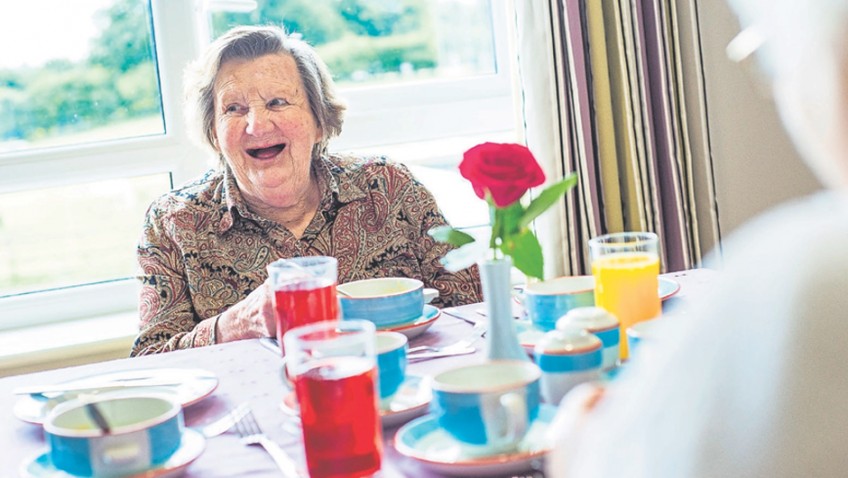Everywhere you turn there appears to be advice on what to eat from carbs to calories, from fat to fibre. But what advice is there on what to eat as we age? Good nutrition and hydration can ensure good health and the rules are easy to follow. Jason Axford, health expert for award-winning residential care provider Care UK, looks at what you need to know.
From the age of 50 onwards we no longer extract the optimum nutrients from our food. This is why it is important that we view how we eat and drink in a new way as we age.
Earlier this year a report by the Malnutrition Task Force found that more than a million older people could be at risk of malnutrition. Research commissioned by Care UK also suggests that many people with limited mobility or dementia do not cook for themselves because they cannot use their kitchen safely, while many more also need help to shop for good, wholesome food.
So what should we be doing to ensure we and our older loved ones stay fit and healthy?
First, it turns out that your mother was right: breakfast is the most important meal of the day. During the night our glucose levels plummet. Our brains need glucose to function and low levels affect our cognitive abilities: in other words we are not at our sharpest before breakfast and this can lead to falls and accidents. For an easy fix try keeping a supply of smoothies in the fridge. They are bright in colour, nutrient-packed, easy to drink and contain fibre to keep things moving.
If you or a loved one has a weak appetite, it may be time to rethink the way you see food. While butter may be the enemy of the dieter or those needing to watch their cholesterol intake, it is the friend of the slim older person. Packed with nutrients and calories, it makes sandwiches easy to swallow and – let’s be honest – tastier. Fortified milk, which includes milk, dried milk and cream, is very easy to incorporate into cereals, soups and puddings, helping to boost calories without causing uncomfortable bloating.
Hand or finger food is great for those with coordination problems, shakes for those with dementia who are always on the go. Muesli bars with chocolate are widely available, as are flapjacks and protein bars for breakfast and sandwiches. Rolls and pizza are great at any time as they allow for variety.
Social eating
Make mealtimes as social an occasion as possible. In our homes, carers and colleagues take meals together because we know that the more we sit, and chat over our meals the more likely we are to eat good and varied servings from our plates. I always take advantage of this for my own personal enjoyment as those we care for have so many experiences to share.
It is a good idea to get a loved one to help setting up the table or clearing away: people feel more engaged and valued when they feel they contribute in some way to a meal.
Hydration is vital to wellbeing at any age. Water makes up more than two-thirds of our body. It lubricates the joints and eyes, aids digestion, flushes out waste and toxins, and keeps the skin healthy. But ageing and conditions such as dementia affect our ability to feel thirst. Some people may well forget to drink, while others may attempt to avoid nocturnal trips to the toilet by avoiding fluids later in the day which can lead to problems such as urine infections.
There are simple ways to increase fluid intake. Being able to see what is inside the glass can help boost fluid consumption, as can using a straw. At our homes we often make an occasion of a drink, sharing a cuppa and a chat to make fluid consumption part of a social activity. We also make drinks look as appealing as possible, adding a slice of lemon to a jug of water, serving cordials in vintage jugs or creating non-alcoholic mocktails with all the trimmings.
A drink is served with every meal or snack. It is a good idea to use a loved one’s favourite cup or glass if you are making meals for someone else. If the loved one is frail or has dementia, try using a jug that has a measure down the side, or a bottle with a measure to monitor the levels of fluid consumed.
Care UK has produced Eating As We Age, a guide created by our experts to provide information on how to overcome problems with nutrition, such as other ways to provide meals without cooking from scratch, restoring an interest in food and encouraging those with diminished appetites to eat, making every mouthful count, as well as advice on how to create an environment that supports older people to dine with dignity.
Copies of the booklet can be downloaded from http://www.careuk.com/care-homes/eating-as-we-age or if you live near a Care UK home you can also pick up a printed copy from the reception of any of our homes. Details of where to find your nearest home can be found at www.careuk.com/care-homes. You can also write off for a copy by dropping a line to the Residential Care Marketing Team, Connaught House, 850 The Crescent, Colchester, Essex, CO4 9QB.





